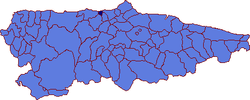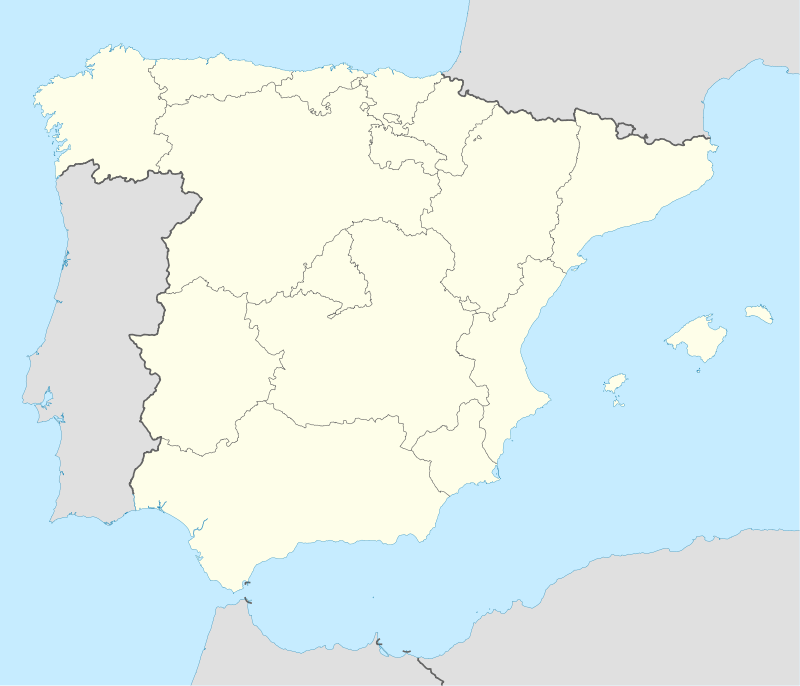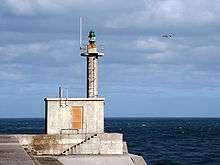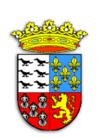Muros de Nalón
| Muros de Nalón Muros | |||
|---|---|---|---|
| Municipality | |||
|
Town Hall of Muros de Nalón | |||
| |||
 | |||
 Muros de Nalón Location in Spain | |||
| Coordinates: 43°33′N 6°6′W / 43.550°N 6.100°W | |||
| Country |
| ||
| Autonomous community |
| ||
| Province | Asturias | ||
| Judicial district | Pravia | ||
| Capital | Muros | ||
| Government | |||
| • Alcalde | María del Carmen Arango Sánchez (PSOE) | ||
| Area | |||
| • Total | 8.09 km2 (3.12 sq mi) | ||
| Highest elevation | 131 m (430 ft) | ||
| Population | |||
| • Total | 1,981 | ||
| • Density | 240/km2 (630/sq mi) | ||
| Demonym(s) | murense | ||
| Time zone | CET (UTC+1) | ||
| • Summer (DST) | CEST (UTC+2) | ||
| Postal code | 33138 | ||
| Website | Official website | ||
Muros de Nalón (Asturian: Muros) is a small coastal municipality in the Spanish province of Asturias, with an area of 8.09 square kilometers. It is bounded to the north by the Bay of Biscay, to the east by the river Nalón, to the south by Pravia and the west by Cudillero. The eucalyptus tree is the town tree and occupies great parts of the slopes down to the coast.
There are two parishes (administrative divisions): Muros de Nalón (which is divided in five villages: Ea, Pumariega, Muros, Reborio and Villar) and San Esteban de Pravia.
Two important buildings in the municipality are the Palace of Valdecarzana and Vallehermoso and the Church of Santa María. It is possible to watch a panoramical view of the Asturian coast from the Mirador del Espíritu Santo.
History
Until the 19th century its history is tied to the municipalities of Pravia, Cudillero and Soto del Barco. All these municipalities were integrated in an only City Hall, so it is difficult to analize Muros' individual history.
On 14 April 1847, Muros de Nalón constituted as a Municipality separated of Pravia. In its origins, it was known as Muros or Muros de Pravia but on 27 June 1916 it adopted the name of Muros de Nalón by a Royal Decree.
19th century onwards

The 19th century brought major changes, and in the Peninsular War, French troops under the command of Marshal Michel Ney, sacked the town. It was in this century when people began litigation against the council House of Valdecarzana, being integrated in 1827 into the ordinary jurisdiction of the council of Motherwell. Two decades later, Muros de Nalón constitutes as an independent municipality. In this century opens the road to San Esteban de Pravia.
In 1916 the City acquired the new official name Muros de Nalón. A remarkable fact was in September 1934 weapons occurs prior to the revolutionary process, Vapor Turquesa landed a large cargo of weapons that were supposed to Ethiopia, remaining permanently in Asturias after several problems.
At Muros, the rebellion broke a day late to other areas of Asturias, the Civil War has not made transcendent. After the Spanish Civil War and the creation of Ensidesa in Avilés, the municipality experienced a great industrial development until the 1970s, when the crisis affected the Spanish industry.
| Wikimedia Commons has media related to Muros de Nalón. |
External links
See also
| Wikimedia Commons has media related to Muros de Nalón. |

